IN A country with a population of almost 110 million, one in five people suffer from mental health problems as reported by the Philippines Statistic Authority in 2010. Former Department of Health Secretary Dr. Paulyn Ubial admitted that the Philippines has one psychiatrist for every 250,000, far from the ideal ratio of one psychiatrist for every 50,000.
In the global statistic of the World Health Organization-Philippines, there are more than 300 million people living with depression, one of the most common mental illnesses. Additionally, the National Statistics Office said mental illnesses are the third most common form of morbidity among Filipinos.
It is undeniable that mental illnesses exist and has been a growing problem in the country.
A Journalism student from the Faculty of Arts and Letters (AB), who requested anonymity, shared that she was clinically diagnosed with depression. She often experienced anxiety attacks and even attempted to commit suicide, but seeking professional help has grounded her.
“For now, I just focus on the little things every day. It helps cope with the stress and keeps the bad thoughts away,” she said.
This increasing problem of mental illnesses in the country has been affecting schools and students. But what do universities do to protect the mental health of their students?
The mental health battle
“At some point, people refuse to seek help from a psychologist or psychiatrist, not really because of the stigma, but because of denial. People tend to deny that they have certain issues […] ’Yung concept na not wanting to accept our own flaws,” said Dr. Darwin Macalanda, vice president of the Accredited Psychologist Association of the Philippines (APAP).
Mental health is an essential component of health and it can be affected by psychological, social, and biological factors. The American Psychiatric Association (APA) defines mental illnesses as health conditions involving changes in thinking, emotion, or behavior. These are associated with distress and/or problems functioning in social, work, or family activities.
In AB, self-perception, relation with family members, and academic pressure were the usual problems that affect the mental health of Artlets, AB guidance counselor Ludeth Zyra Angeles told the Flame.
For Assistant Dean Narcisa Tabirara, inability to cope with academic workload may trigger anxiety and other mental disorders in students.
“There will always be periods when there are greater demands for the students. […] There are always periods of stress. Generally, students are expected to be able to handle this. But we are also beginning to realize that a good number are unable to cope for different reasons,” Tabirara said.
In the past few years, the AB administration prioritized making sure that Artlets strictly comply with the Faculty’s rules, but now, the mental health of Artlets is becoming a primary concern and topic of discussion in every administration meeting.
Last year, the administration held a series of seminars to increase mental health awareness among the faculty members.
Out of 3500 students in AB, there are 70 students known to have active cases of mental illnesses, and are being monitored on a daily basis. This is still a small number compared to the total population of students, Tabirara said.
Artlets helping artlets
The AB Career and Counselling Office has always been at the forefront of waging the battle for mental health, but when the problem intensified, the Arts and Letters Student Council (ABSC) decided to lend a hand—thus, the mental health volunteer project was born.
“They (Artlets) are shying away from seeing professionals, so we made the mental health volunteers as something much like peer facilitators kasi students find it easy to talk to someone of their equals,” Quesada said.
ABSC Vice President for Internal Affairs Clio Ocampo, the head of the mental health volunteer program, said the need to address the mental health cases motivated her to push the project.
Ocampo plans to pattern her system after the Red Cross model of having two representatives per block section in every program in AB. These volunteers took personality tests given by the guidance office to assess their mental health and capabilities.
“May mga gustong mag-apply kasi sila mismo nakakaranas ng ganong experiences. Although we want them to help as well, pero kasi if you want someone na ganon kalaki ‘yung duty na ibi-bear sa classroom, you want someone to be stable rin,” Ocampo said
After passing the exams, the volunteers would go through series of trainings to educate them how to handle people with mental health problems and what to do in case of emergency.
The first training held on Feb.15 was about mental health and its importance, coping with burnout and how to handle stress, and explaining the first-aid module. It also talked about identifying the factors of mental health problems and ways to solve them.
What differentiates the project from other initiatives is that it is a classroom- based approach, Ocampo said. “Hindi buong AB ‘yung sine-serve nung mental health volunteers kung hindi ‘yung mga kaklase mo, ‘yung mga kasama mo araw-araw. Sobrang basic niya pero if you think about it, in case of emergency, it could save lives.”
Aside from the AB Career and Counselling Office, the ABSC also collaborated with the Youth for Mental Health (Y4MH) Coalition, a group of student organizations and youth advocates that work to end the stigma on mental health illness and to elevate the FIlipino youth’s consciousness on mental health.
The role of the guidance counselors is to further intensify guidance services and facilitate room-to-room visit discussions, starting on resiliency. The Y4MH facilitated the policy-making activity where volunteers made their own plans and policies to combat the mental health problems in AB.
While the mental health volunteers are limited to giving first aid to Artlets suffering from mental illnesses, the AB Career and Counselling Office is open for those with more serious problems.
“Pwede nilang dalhin sa guidance office if alam nilang hindi na nila kayang i-handle. Tinuturo sa module kung paano i-identify if kaya pa sa first aid ‘yun,” Ocampo said.
While the project was said to be well-received in the Faculty, there are still some Artlets who remain critical of the AB Mental Health volunteer program.
“I think it’s not really effective. May mga uma-attend pero hindi ko pa masabi na nagawa na nila ‘yung part nila, kulang pa. Masasabi kong accomplished and okay ‘yung mga projects nila if may mahikayat silang tao na may pinagdadaanan na ganong problema na lumapit sa kanila,” History junior Victor Kho said.
For Communication Arts junior Larissa Olimpo, the project is still not enough and was only done because suicide incidents have already happened. “So if for example hindi nangyari ‘yung ganito, ‘yung ganyan, siguro, parang wala silang gagawin to raise awareness about it. […] Merong mental health volunteers, pero parang for this year, it’s late,” Olimpo said.
Sustainability of the project
Ocampo, together with mental health volunteers, AB guidance, and Y4MH Coalition, aims to make the project a stepping stone to create a network of mental health volunteers in the whole University, not just in AB. As to how this will be executed, there is no concrete plan yet.
To address those expressing concern over the sustainability of the project, Jarvin Tan, director for Research for Y4MH, said the policy-workshop they facilitated was already for sustainable change—it just needs funding.
“It has to be linked up with the office or guidance that has the funding, the personnel, [and] licensed professionals. They can also tap other licensed professionals like psychologists to carry out ano man ‘yung mga na-plan out ng mga students. Again, kapag wala na sila or ‘yung turn-over ng guidance, may policies in place na,” Tan said.
“Hopefully it goes well sa AB, ma-copy ng ibang colleges. All it needs is a successful model. When there’s a successful model, other colleges, other institutions will follow,” he added.
Other universities are also using referral systems and peer facilitators to combat mental health problems among their students.
The Far Eastern University and its guidance office has been orienting and training their students on the basic counselling skills to help in aiding mental health problems. They act as peer-facilitators and work hand-in-hand with the guidance office if there are perceived “red flags” or suicide tendencies.
The same goes with universities outside Metro Manila such as Siliman University, University of San Carlos, and Xavier University.
While efforts to combat mental illnesses is not new in AB, Quesada said this time, the Career and Counselling Office has been making greater efforts to address the worsening problem.
“Sabi nga ang collaboration ay nagging mas maigting. It became more intense. Everyone was concerned about mental health [even] before,” Quesada said. “If they say na kaya lang naman nagkaroon ng ganyan kasi may nangyari—no—kaya higit nating kailangan. It existed, but the need became greater because we saw a need to intensify.” F FATE EMERALD COLOBONG and ALYSSA MAE S. RAFAEL
HOPELINE hotline
(for emotional crisis and suicide prevention)
804-HOPE (4673)
0917558 HOPE 2919 for Globe subscribers
Website: http://www.ngf-hope.org/contact-us/
National Center for Mental Health
(02) 531 9001
Website: www.ncmh.gov.ph
Located at Nueve de Pebrero St., Mauway, Mandaluyong
UST Counseling and Career Center
406-1611 local 8212/740-9720
Located at Room 204, UST Health Service Bldg., España Manila



